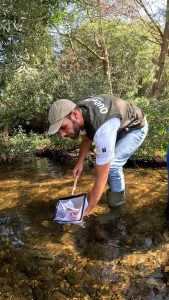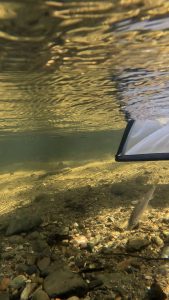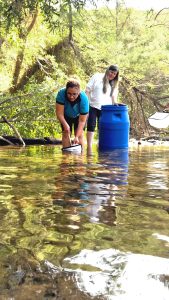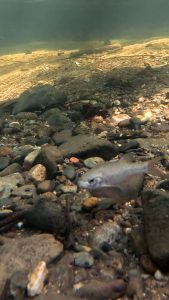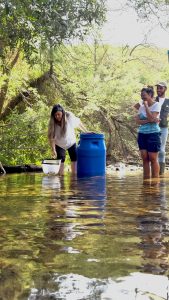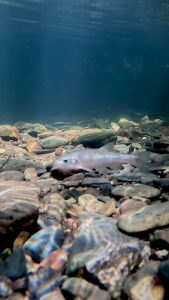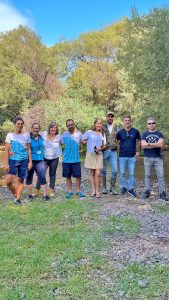July 14th, 2025
Zoomarine has announced a restocking operation that took place in the Odelouca stream, in the Algarve, with the release of twenty Arade-chubs (Squalius aradensis), a freshwater fish species currently classified as Critically Endangered. This operation was part of the Falanges Project, an initiative promoted by Águas do Algarve, in partnership with Zoomarine and Quercus, with the aim of strengthening populations of native fish species from Algarve streams that are under threat of extinction.
Since its launch, the Falanges Project has been responsible for ex-situ breeding efforts to create assurance populations that may, at a later stage, reinforce wild populations in their natural habitats. These populations support restocking efforts once conditions in the streams have been restored and sustainability ensured. Within this scope, the Falanges partnership has been implementing breeding programmes for three native species: the Arade-chub (Squalius aradensis), the Southwest Iberian straight-mouth nase (Iberochondrostoma almacai), and the Southern Iberian barbel (Luciobarbus sclateri).
In 2025, around thirty Arade chub fry were born at Zoomarine, twenty of which have now been released into the Odelouca stream – their natural habitat – by professionals from Zoomarine’s Science and Conservation team, together with Águas do Algarve and Quercus.
“Although our perception of drought may have been softened by the welcome rainfall in May, periods of water scarcity in the Algarve are becoming more frequent and continue to threaten the future of this species, which exists nowhere else in the world. This makes projects like Falanges all the more essential,” said João Neves, Director of Science and Conservation at Zoomarine.
“Seeing these twenty individuals reinforcing the wild population of this stream brings a shared sense of purpose accomplished. We know that the path ahead holds considerable challenges, but we are fully committed to continuing our conservation efforts in close partnership with Águas do Algarve and Quercus, to protect these valuable natural resources.”
“We are very pleased with the outcome of this restocking action and the excellent coordination between the partners. Although led by Águas do Algarve, the Falanges Project is the result of cooperation between three entities with different backgrounds, but a common goal: to implement a conservation project in the Algarve for the protection of three freshwater fish species endemic to southwestern Portugal – two of which are currently Critically Endangered,” said Marisa Viriato, Head of the Water Sources Department at Águas do Algarve.
“With this partnership, we aim to contribute to the conservation and enhancement of riparian ecosystems in the Algarve region. Our initial focus area is the Arade-Odelouca Site of Community Importance. Alongside the breeding and restocking programme, we are also strongly committed to activities such as water quality monitoring, ecological and fish population assessments, and an environmental awareness campaign that highlights the vital services provided by river ecosystems, their role in the urban water cycle, and the urgent need to preserve the Algarve’s biological diversity.”
According to Carlos Silva, Coordinator of Riparian Ecosystem Conservation Projects at Quercus: “Portugal’s watercourses are under significant pressure. The combined effects of human activity and climate change – including increasingly prolonged droughts – are devastating to the species inhabiting our rivers, and the Arade chub is one such species. The Falanges Project plays a crucial role for the Algarve and the country as a whole. It exemplifies how collaboration between three organisations with a shared purpose can contribute significantly to both our understanding and the conservation status of our natural heritage and biodiversity. The release of another twenty individuals of this uniquely Portuguese species into the Odelouca stream fills us with satisfaction and hope. It is a meaningful contribution to the long-term survival of this species in its natural environment.”
The Arade chub is currently found in the Arade river basin – where the largest known population remains – and is also present in the Alvor, Aljezur, Quarteira and Seixe streams. According to the Red Book of Portuguese Vertebrates – the national reference for the conservation status of vertebrate species – the main causes of its population decline include changes to the natural hydrological regime (e.g., dam construction), the spread of non-native species, and the deterioration of water quality.
In response to this scenario, Zoomarine continues to increase its investment in the protection and conservation of species and habitats, working with various partners on projects aimed at rescuing, rehabilitating and returning marine and aquatic animals to their natural environment. The Falanges Project is a clear example of this commitment. Since the arrival of the first individuals at Zoomarine two years ago, around 30 Arade chub have been successfully bred.
Visitors are welcome to learn more about this urgent conservation project and observe both the Arade chub and other native species on display at Oceanus Aquarium, located within Zoomarine.
Together, We Protect!
